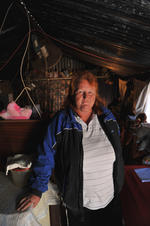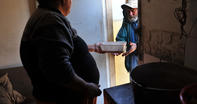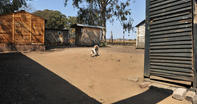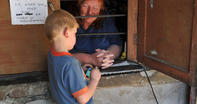A Kind of Wily Survival

Cornelia’s story typifies the kind of wily survival needed for those who fall out of the formal sector and have to find other ways to make ends meet. Hers is not a scavenged existence. Neither is it calculated or planned. It is just the accumulation of nearly a decade of shrewd responses to a hard life by a resourceful person.
Nine years ago, Cornelia arrived at the Sonskynhoekie shelter penniless and destitute, with nothing but a small bag of clothes. She did what she was told, slept in the Wendy that was allocated to her, ate what was splashed into her bowl each day. Today she controls the resources of this camp: she brings in a few thousand rands’ worth of food donations every month.
She holds the key to the storeroom. She manages the kitchen roster. She decides what each day’s meals will be. She has first dibs on bags of clothes that get dropped off from time to time by a passing car. Hard work and careful manoeuvring have got her one of the best Wendys, with electricity and a basic kitchen.
She can afford to buy her own food and make her own meals, so she does not have to queue for the communal pot any more. Her job allows her to watch over the rest of the camp while they single-file their way to the front of the meal queue twice a day. She has clout, and she wields it.
Dealing with Donations
‘Dis ons groot problem, transport,’ she says,(‘This is our big problem, transport,’ she says.) explaining how difficult it can be to collect the donations she arranges using her cellphone and a growing network of people in the food retail sector. ‘Vervoer is die. ..’,(‘Transport is the...’) a disembodied male voice steps into the conversation from somewhere in the breakfast line.
‘Ek sê mos, transport,’ she retorts. (‘That is what I said, transport,’ she retorts.) Undeterred, the man tries to interject again. ‘Hoor hier.’ Her voice is a restrained whip. ‘Ons praat!’ (‘Listen here.’ Her voice is a restrained whip. ‘We are talking!’) Order restored, she tucks back into the slipstream of her story. ‘I just phone a shop and ask to speak to the person who deals with donations.
I say I’m from Sonskynhoekie and that there are people here who are struggling. Can you help, I ask. Then they’ll say come this or that day. ‘But you have to be careful what you say. Many of them will want to know “are you white and black?” Some only want to help whites. Some won’t help if you don’t have blacks living with you. So you have to use your own discretion.
Mostly I just say, “There are two or three [black people] but they live apart from us”, which is true because they live over there.’ She points with invisible blonde eyebrows in the direction of a far corner of the camp. Once she has set up a good connection, she will find out if she can collect from them regularly. If so, when? She will get a fixed time, a set day.
She never asks for anything specific; the centre will take whatever donors can help them with. ‘We get chicken from the chicken farm. Soos hulle die goed geslag het, met die vlerkies af (Just as they have slaughtered them, with the wings cut off).
Another shop gives us sugar, rice, sulke groot sakke wat hulle opmaak, soap powder (Another shop gives us sugar, rice, these big bags that they make up, soap powder). I get our buns there, mealie meal.’ The big stores will not donate stock that is on the shelves and still sellable. Rather, they will give away food that has been removed from the retail chain because the packaging is broken, even though the food is still fine. They are often given that, she explains.
Everyone Has a Story

A clatter of birdsong from the nearby gum tree intrudes as Allison Jackson tucks into the queue. ‘And here’s my kitchen bitch.’ Cornelia’s jocularity draws a sideways glance from the out-of-work registered nurse. At 56, she works off the R400-per-month rent she cannot afford to pay by cleaning the kitchen.
Singled out by the matriarch, the diminutive woman smiles shyly from beneath a blunt, untailored fringe while she holds her breakfast bowl in fingers that have contracted into right angles with arthritis.
Somehow, in this awkward space in the breakfast line, her life gets laid out in bullet points: married to an American who spent time in Vietnam; fifteen years with him in Israel; he goes back to New York to die of cancer; she returns home, meets another man, but now he is gone too (her eyes gesticulate skywards); there is a hint of alcohol somewhere in the story, but after a bout in hospital following an alcoholic seizure she has decided to steer clear of the bottle.
Too young for a state pension, unable to practise as a nurse, she survives on the dregs of a trust fund left to her by her father, but the R300 to R400 a month income has been leached down to just R30 by the collapsed markets. And so she cleans the kitchen Cornelia has taken charge of, and accepts the moniker of ‘kitchen bitch’. Everyone here has a story.
Most of them want to hide it. Everyone here obeys the hammered commands of a discarded tyre rim that hangs from a nearby gum tree and clatters to life several times a day: the call to rise at 7 a.m., morning devotions at 7.30 a.m., come to breakfast at 10 a.m., dinner at 5 p.m., church on Sundays. And everyone here eats the food that Cornelia decides will be doled out each day.
First Impressions
This is the landscape South African artist Pierneef did not paint. It has the same strip-barked gums and grass that is sun-baked down to a crackly beige. But in the distance, four wide-hipped cooling towers slouch beneath a low-slung early morning Pretoria haze that is muddy and languid in anticipation of the late-autumn heat. Here, everything that sits still long enough is dusted over with a downy talcum that is stirred up from the dirt road as corrugated as the iron Wendys that wait at the end of the track.
Remembering her first impressions of the place, Cornelia’s face drops its impassivity for a moment. She shakes her head, almost incredulous at the memory, as a laugh rumbles through her broad frame. ‘Oooooh, jy wil nie weet nie!’ (‘Oooooh, you do not want to know!’).
She is wedged back into a garden chair outside her two Wendy houses – one to live in, the other as a storeroom for her washing machine (‘it doesn’t spin, but it washes, and that’s all you need’) and other bits and bobs. ‘That’s where I store my clothes, and my firewood that they want to steal.’
Eyes the colour of blue Swarovski crystal seem out of place in a fair-skinned face that is pinked over from years of standing in car parks in the Highveld sun. It was losing that job that landed her here in the first place.
Born in De Aar
Cornelia Terblanche was born in De Aar in 1956. The daughter of a road worker (‘’n padmaker, hy het paaie gemaak’ [‘a road worker, he built roads’]) and one of eight children, Cornelia finished school at seventeen with a Standard Seven. There was no money to pay for her to finish high school.
Her father was sickly by the time the family moved to Kimberley, and she took a job selling milk in a local dairy. It was on a trip to Bloemfontein that she met Daniel, a shunter with the spoorweg (railways), and the man she would marry at the age of twenty. The marriage lasted for ten years, but, she says, she had too much freedom, too much money.
‘Actually, I married too young, I still wanted to jol [have fun]. When he got home on Friday nights, I was gone. I’d only get home on Monday. Ek het hom geskei sonder dat hy weet ek skei.’ (I decided to divorce him without him knowing it.) She lived on her own in a flat that he paid for until, eventually, she sent him the divorce papers.
Then she took a job at Fidelity Guards, making up pay packages of cash at a desk where she sat across from her mother. But when her mother died, she could not go back. It was too heartsore for her to sit there, the hole left by her mother gaping from the opposite chair. Then she met ‘Skollie’, Johan.
She was actually dating his brother at the time, but the man beat her, she says pragmatically, so she booted him out. ‘My ribbes was af. Toe begin sy broer. .. hy het my altyd gaan pille koop, en so het dit maar begin.’ (‘My ribs were broken. Then his brother began. .. he would buy me pills, and so that is how it began.’).
Work as a Carguard
They lived in Vanderbijlpark, him working as a car guard, she helping him out at weekends. But he met another woman – her best friend, she later admits – and so they split up and she carried on working car parks on her own. It might look random, the car guarding business, but in the neighbourhood where Cornelia worked, it was not simply a matter of pegging out her turf for the day, first-come-first-served.
Someone gets a contract with a local shopping centre, she explains, and then employs the guards. Each one will be allocated a set number of bays to work every day. You give the boss some of your takings and keep the rest. One of her bosses took R15 for every ‘staanplek’ (position), and a rand per card written out. He would get about R100 per day out of each car guard. Anything over and above that, she would take home.
But her last gig – at the Shoprite in Lyttelton, in Pretoria – ended with the boss’s contract. She was living in a squat with a friend, Rosa, where they paid for their rooms by the night. Without a guarding job during the day, there could be no bed at night. And so it was, one summer afternoon, that Rosa and Cornelia found themselves penniless, and without anywhere to sleep that night.
They asked at a local church if someone might know where they could find a shelter. Sonskynhoekie had a place for them, but it took them two days to walk from Pretoria to the plot north of Wonderboom. A security guard let them sleep on a station platform en route. They arrived at Sonskynhoekie at 8 p.m. on a Friday. Hungry. No food. No money. No smokes. No smokes!
First Night at Sonskynhoekie

A grim first night lay ahead. A typical Highveld storm burrowed its rain through the leaking roof of the Wendy they had to share, soaking one of the beds, the bedding, everything papnat gereën (rain- drenched). They huddled together on a dry corner of a bed, waiting the night out.
Next morning, they were given the care centre’s standard breakfast – pap – and ate it just like that, no sugar, no butter, no added milk. ‘We didn’t know how this place works, that you have to bring your own sugar and things. We ate that bitter porridge just like that because we were hungry.
When you’re hungry you don’t taste it, you eat it because you want to get full. I thought, “What kind of a place is this?” But you have to have a place to stay. ‘I can’t describe that feeling. You want to go away but you don’t know where to go to. You’re heartsore. You cry. You don’t know how you’re going to get by. And will you ever be able to survive here?
Can white people live like this?’ It was tough back then. There were no food donations coming in. But since then, they have learned to ask for help. ‘You’re proud, you had everything. How can you ask people for these things? You’re embarrassed. But I’ve learned, if you don’t ask, then people are going to go hungry.’
Working Her Way Up

She was ‘the same as the others’, taking her turn to cook and clean, queuing for meals, obeying the call of the bell. But her fastidiousness in the kitchen caught the attention of the owner, who remarked on how well she cleaned up after herself, and put her in charge of the kitchen.
‘For two years I cooked alone, every day. I peeled vegetables. I scrubbed pots. Everything on my own, breakfast and dinner. Now I’m in charge of the kitchen. I worked for this job!’ Next, she was responsible for bringing in food donations and managing the stores. Over the years, she has forged an important alliance with the Sonskynhoekie founders – the Duvenhages – in particular, with the daughter-in-law Annetjie.
Cornelia’s Wendy is right next to Annetjie’s house and the relationship allows her access to resources she would not otherwise have. The friendship with the very private Annetjie means she can keep her weekly meat supply in Annetjie’s fridge and freezer. The two of them do shopping for one another (Annetjie’s husband has a car; Cornelia will get a lift or take a taxi when she needs to get to the stores).
Cornelia holds down the fort in Annetjie’s tuck shop every now and then. She does not just have the ear of the Sonskynhoekie owners, she has an allegiance. And that is a powerful place to be.